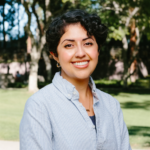FOR IMMEDIATE RELEASE
Contact: lppipress@luskin.ucla.edu
Potential Federal Medicaid Funding Cuts Jeopardize Latino Access to Lifesaving Health Care With Medi-Cal, New UCLA LPPI Data Brief Warns
With over 14 million enrollees, Medi-Cal provides health care coverage to one-third of California’s population, and more than half (52%) of its beneficiaries are Latino.
LOS ANGELES (April 24, 2025) – The potential significant cuts to the federal Medicaid budget, coupled with California’s sizable budget gap to fund the Medi-Cal (California’s Medicaid program) expansion, bring severe challenges for Medi-Cal. A new data brief from the UCLA Latino Policy and Politics Institute (LPPI) highlights the real-life stakes: Latinos make up more than half of Medi-Cal’s recipients. Children, seniors, and working beneficiaries who power California’s economy are now at risk of being left out of lifesaving health care.
Authored by Rosario Majano, Jie Zong, Ahmad Ismail, Dr. Silvia González, and Dr. Arturo Vargas Bustamante, the analysis draws on data from the California Department of Health Care Services, the Census Bureau’s American Community Survey, and the California Health Interview Survey.
With federal funding covering 67% of Medi-Cal’s budget, proposed cuts could force California policymakers to impose stringent work requirements, eligibility restrictions, and reductions in benefits such as dental and vision care. The brief underscores the disproportionate harm that cuts to Medi-Cal would inflict on Latino enrollees, who represent a significant portion of the program’s beneficiaries across key counties and congressional districts.
Key findings include:
- Disproportionate Impact on Latinos: Latinos make up 52% of Medi-Cal enrollees, compared to their 40% share of the state’s population.
- Labor Force Participation: Latino Medi-Cal beneficiaries participate in the labor force at higher rates (63%) than other groups, yet work requirements could lead to 2.3 million enrollees losing coverage, over half of whom are Latino.
- Essential Workers: Over 1.4 million Latino Medi-Cal enrollees work in critical industries like hospitality, health care, and construction, often in low-wage jobs without employer-sponsored insurance.
- Youth and Seniors: Latino children account for 38% of Latino enrollees, while Latino seniors account for 35% of senior enrollees. Both groups rely heavily on Medi-Cal for regular health care coverage and long-term care.
- Chronic Conditions: Latino and Black enrollees face higher rates of diabetes (18%) compared to the general population (11%), with Medi-Cal providing vital care for managing chronic conditions.
- Geographic Impact: Counties like Los Angeles, Riverside, and Fresno, and congressional districts such as CA-22, CA-34, and CA-35, with large Latino populations, would face significant economic and health challenges from cuts.
“Medi-Cal is a lifeline for millions of Californians, particularly for Latino families, workers, and communities who contribute immensely to our state’s economy and vitality,” said Bustamante. “Cuts to this program would not only jeopardize health care access but also destabilize essential industries and regions critical to California’s future.”
Read the data brief here.
###
About UCLA Latino Policy and Politics Institute:
The UCLA Latino Policy and Politics Institute is a non-partisan research institute that seeks to inform, engage, and empower Latinos through innovative research and policy analysis. LPPI aims to promote equitable and inclusive policies that address the needs of the Latino community and advance social justice. latino.ucla.edu.














